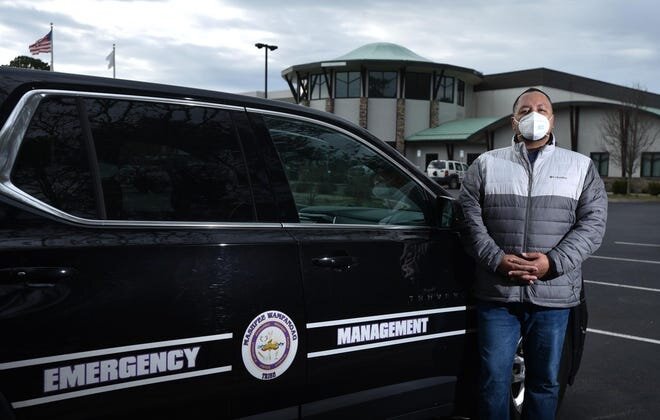A Model Program: FEMA Says Mashpee is Winning the Fight Against Covid
Last month the Federal Emergency Management Agency highlighted the Mashpee Wampanoag Tribe response to COVID-19 pandemic in a nation-wide press release, titled “One Tribal Nation Winning Against COVID.” FEMA praised the Mashpee Wampanoag Tribe and its emergency management director Nelson Andrews Jr. in the announcement for the steps he took in response to the COVID-19 outbreak.
“Before ‘COVID-19’ became entrenched in our language, tribal leaders were mapping out a plan,” the statement says. “The Mashpee Wampanoag was the first Native American tribe in the region and second in the country to establish a COVID strategy.”
Andrews approached the tribal council before President Trump declared the pandemic a national emergency and asked to declare a state of emergency and shut everything down.
He and the emergency management department shut down nonessential services and activities. Andrews, who previously worked for FEMA for 10 years, also drafted a letter to FEMA’s regional administrator, Capt. W. Russell Webster, requesting direct federal assistance.
Webster quickly responded and agreed to support the tribe in whatever way possible. He sent Federal Coordinating Officer Adam Burpee to serve as FEMA’s liaison to the tribal nation to help them apply for resources.
The Mashpee Wampanoag Tribe was the first in New England and the second in the nation to apply for federal assistance, following the Seminole Tribe of Florida.
Most tribes opt to seek resources through the state rather than the federal level, Andrews said, as it is more difficult to go through the federal government. Out of 576 recognized tribes, 43 opted to become direct recipients under FEMA, Andrews said.
FEMA approved the tribe’s agreement and awarded it more than $130,000 in public assistance grants, which were used to purchase security glass, disinfectants and also provided shelter for the Tribe’s homeless, the statement says.
The FEMA Region One warehouse shipped the tribe about 13,000 cloth face coverings, 6,000 procedural masks, 26,000 Nitrile gloves, 5,000 bottles of hand sanitizer, 8,330 N95 respirator masks and 5,370 KN95 respirator masks.
“We started getting the masks, the hand sanitizers, everything else before any other town or municipality or anybody else,” Andrews said.
The CDC also sent epidemiologists, a contact tracing team, infection prevention and control team, and an incident command team to support the tribe for 60 days.
Andrews used $30,000 of emergency management funds to rent a hotel where infected tribal members could quarantine and isolate, he said.
The tribe was also one of the first to receive test kits thanks to the federal agreement. By mid-April, all tribal members could get free testing, regardless of symptoms, through the Indian Health Services clinic in Mashpee.
Of the 1,500 tests conducted at the clinic, 28 people tested positive, Andrews said. But unless tribal members are tested at an IHS clinic, there is no way of tracking positivity rates among the tribal community.
“Nelson and his staff have implemented critical health and safety standards since the onset of the Covid-19 pandemic,” said Vice Chairwoman Jessie “little doe” Baird. “The Tribal Council will continue to rely on Nelson’s guidance, recommendations and strategies through these next crucial phases of the pandemic in order to best protect our citizens.”
As the second wave of COVID-19 cases continues to surge across the state and the country, Andrews and the tribe’s emergency management department continue to allocate resources. Andrews submitted another request this week for more PPE to stockpile for the winter, and the department will distribute the items to the tribe’s most vulnerable members.
It is also in the process of hiring an infectious disease public health advisor and an infectious disease epidemiologist.
“With those two positions in place, we’ll be able to, I think, battle the pandemic in a better manner with their expertise,” Andrews said.
He is also working to ensure the tribe receives vaccinations when they become available. The clinic is setting up for cold storage and distribution of the vaccine, Andrews said.
Andrews urged tribal members to continue practicing COVID-19 safety protocols. Many people have gotten “COVID fatigue,” he said, and are tired of following rules, wearing a mask and social distancing.



